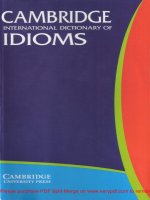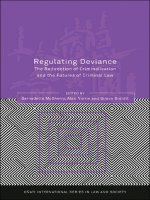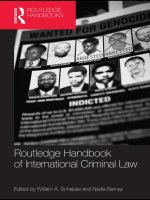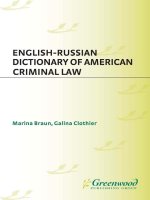ENGLISH-RUSSIAN DICTIONARY OF AMERICAN CRIMINAL LAW pptx
Bạn đang xem bản rút gọn của tài liệu. Xem và tải ngay bản đầy đủ của tài liệu tại đây (15.86 MB, 350 trang )
ENGLISH-RUSSIAN
DICTIONARY
OF
AMERICAN
CRIMINAL
LAW
This page intentionally left blank
ENGLISH-RUSSIAN
DICTIONARY OF
AMERICAN
CRIMINAL LAW
MARINA BRAUN
AND GALINA CLOTHIER
FOREWORD
BY PHILIP
A.
LEWIS
GREENWOOD PRESS
Westport, Connecticut • London
Library of Congress
Cataloging-in-Publication
Data
Braun, Marina, 1950-
English-Russian Dictionary of American Criminal Law / Marina Braun
and Galina Clothier ; foreword by Philip A.
Lewis,
p.
cm.
Includes bibliographical references and index.
ISBN 0-313-30455-6
(alk.
paper)
1.
Criminal
law—United
States—Dictionaries.
2. English
language—Dictionaries—Russian.
I. Clothier, Galina, 1964- .
II.
Title.
KF9217.B73
1998
345'.003—DC21
97-43933
British Library Cataloguing in Publication Data is available.
Copyright © 1998 by Marina Braun and Galina Clothier
AH rights reserved. No portion of this book may be
reproduced, by any process or technique, without the
express written consent of the publisher.
Library of Congress Catalog Card Number: 97-43933
ISBN: 0-313-30455-6
First published in 1998
Greenwood Press, 88 Post Road West, Westport, CT
06881
An imprint of Greenwood Publishing Group, Inc.
Printed in the United States of America
<§>"
The paper used in this book complies with the
Permanent Paper Standard issued by the National
Information Standards Organization
(Z39.48-1984).
10 9 8 7 6 5 4 3
To
Esmond Braun and Chad Clothier
for their invaluable assistance,
understanding, and patience
This page intentionally left blank
Contents
Foreword by Philip A. Lewis ix
Preface xi
Acknowledgments xv
Abbreviations xvii
Introduction 1
English-Russian Dictionary of American Criminal Law 5
Appendix: Court-Related Documents and Their Russian Translation
281
This page intentionally left blank
Foreword
Among the many challenges that any attorney might encounter at least once in
his or her career is the task of representing a person from a vastly different
culture. Although the
first
and most obvious obstacle might be the language
differences, the attorney will soon find that the problems preventing effective
attorney-client communication run much deeper and involve much more subtle
nuances than merely having a document, conversation, or court appearance
translated. Rather, the attorney will soon be engulfed in one frustration after
another in the course of attempting to obtain simple and consistent responses to
apparently straightforward questions or circumstances. Without realizing it, the
attorney and even the client may soon give up; the attorney's enthusiasm will
wane; and, equally dangerous, the client will begin simply to nod or otherwise
respond in a fashion that falsely gives the impression that he or she understands
what is occurring. The results can be disastrous for the client and none too
pleasant for the attorney either.
One needs only travel for a short time in a different country to realize that
the differences are more than language. So much — from the pace of life to
family relationships, to our views of government and our relationship to it —
differs remarkably from one land to another. The traveler realizes that few
things can be assumed. The problem actually encompasses what we now refer to
as cultural differences.
As with the traveler, the dizzying array of differences and assumptions
that can no longer be made might not be readily apparent to the unwary attorney.
For example, even the most uneducated American has an understanding of this
country's judicial system and the respective roles of the judges, juries, and
attorneys that is relatively sophisticated compared to that of many who have
come from another culture. Perhaps the most obvious reason for this is that each
X
Foreword
country and culture has a different outlook on life, not to mention a vastly
different legal system.
In addition, we must keep in mind that because of
our
peculiar history we
tend to identify ourselves largely in political terms. When asked to explain what
makes America what it is, the average American will
frequently
first think of the
founding of our county, our revolution and separation from the British, the
Constitution, democracy, and the westward expansion with the addition of new
states.
That would not be the case if
one
were to ask a person from virtually any
other part of
the
world. If asked to describe what makes his country French, the
average Frenchman would hardly be expected to make reference to his
government but instead would more likely speak of his county's language, art,
food, and wine. I would venture a guess that the same would be so in most
countries around the world regardless of their levels of development, and that
few would have as much of
an
idea of how their respective governments operate
as does the average American.
The attorney and interpreter must be prepared to spend the necessary time
before, after, and sometimes, where appropriate, during a conversation with the
client, discussing what concepts the client is likely to comprehend without
further explanation and what will need additional explanation.
Remarkably, despite the ever-increasing influx of immigrants from around
the world and their increasing involvement in the legal system, few resources
are available to the interpreter and attorney to assist them in bridging the
language and cultural gaps that exist.
This dictionary, emphasizing as it does the words and phrases that one is
most likely to encounter in a legal environment, is therefore especially valuable
to any interpreter working with attorneys and the courts. It will be of great
assistance to any attorney faced with the challenge of explaining to a Russian
client the notion that an attorney, even one appointed by the court, has a
fiduciary obligation to the client: and that attorney-client communications are
virtually sacrosanct, or such everyday things as what it means to exercise or
waive rights like the right to remain silent, the right to a jury trial, or the right to
require the government to prove guilt beyond a reasonable doubt.
Representing those from other cultures will always be difficult, even
without the language barriers. However, this book will enable attorneys to meet
the challenges in a more intelligent and effective fashion.
— Philip A. Lewis
Preface
This book is a unique reference, aimed at filling in the existing void and
bridging a linguistic, as well as a cultural, gap between Americans and Russians
in the legal sphere. It is the first English-Russian Dictionary of American
Criminal Law to be published in this country.
The demand for this kind of materials in the United States has been
growing steadily over the past few years. Since the end of the Cold War
thousands of Russians have come to the United States including political and
religious refugees, immigrants, scientists, tourists, business people, and,
regrettably, criminals. The Russian Mafia terrorizes American cities on the East
Coast and is spreading its activities to Los Angeles and San Francisco.
There are also those who find themselves in courts of law because of the
cultural differences between the two countries.
A number of solutions are needed to cope with
this
newly emerged
problem in the United States. Among them is the elimination of cultural and
language barriers, an achievement that will add another dimension to the
concept of multiculturalism in American society. This is exactly what this
dictionary aims to do.
It will help attorneys, judges, law-enforcement officers who deal with
Russians in the United States (with clients, professional delegations from the
former Soviet Union — the increasing number of which also testifies to the need
of this kind of reference material, etc.), as well as professionals in the legal area
who go to Russia as part of government educational or exchange projects.
It will be invaluable to court interpreters, instructors and students of
courses in court translation and interpretation (many schools are adding such
courses to their curricula), and to compilers of exams and tests for the state and
federal court interpreters certification process.
Xll
Preface
We hope that the staff of the newly organized FBI headquarters in
Moscow will also find this dictionary helpful.
For other languages (Spanish, for example), the need for this kind of
materials is adequately met by the existing references. In Russian, however,
there is not only a shortage but a virtual vacuum. The fact that no court
interpreters certification test in Russian has been offered until recently, for lack
of appropriate examination materials, is the best illustration. (A certification test
is a requirement for all court interpreters and has been offered in other languages
for a number of years.) None have been published in the United States so far.
The few dictionaries published in Russia are, for obvious reasons, not readily
available. Also, they have a number of serious flaws that make them unreliable
sources. Their major drawback is that they are not based on the American
judicial system, a defect that results in incomplete and at times incorrect
translation of American legal terms.
This dictionary will answer the needs of Russian lawyers, judges, law
students, police officers — all those who have professional relations with
Americans in the legal sphere, who are studying American justice and law-
enforcement system, and those who come to this country as part of the numerous
exchange programs.
It will be helpful for laymen, too, who seek to understand English either in
its oral or written form. Texts dealing with criminal/legal issues appear regularly
in daily newspapers and on television. Frequently they are difficult for Russians
to understand without an appropriate reference.
The area dealt with in this dictionary is criminal law. It is the first part of
a
larger project which will cover other areas of the law. The dictionary does not
address all words pertaining to the sphere of criminal law; it is limited to the
most frequently used words (not only terms but also words belonging to the
common core of the language and are extensively used in legal, court and law-
enforcement settings, as well as words found outside the literary/normative layer
of
the
language [i.e., slang
and
jargon]).
Neither is it a complete compilation of
court-related documents. It includes only those used most often (e.g., a list of
Miranda rights, a plea offer, a waiver of a jury trial, an affidavit of indigency).
The book's format makes it a very convenient source of useful
information which can be used by a variety of professionals in their daily work.
The organizing principles, the structure of the whole dictionary, and that
of
each
entry, etc., are outlined in the introduction that follows.
Among the most useful of the lexicographical sources consulted are:
Alexandrova, Z. Slovar
Sinonimov
Russkogo
Yazika.
7th ed. Moscow: Russky
Yazyk, 1993.
Americana.
English-Russian
Encyclopedic Dictionary. Smolensk: Polygramma,
1996.
Andrianov, S., A. Berson, and A. Nikiforov.
English-Russian
Law Dictionary.
Moscow: Russky Yazyk Publishers Reya Ltd., 1993.
Preface
xin
Baskakova, M. A. Legal Dictionary for
Businessmen.
6th ed. Moscow: Finanssi
I Statistika, 1994.
Belkin, R. Kriminalistika. Kratkaya Enciclopedia. Moscow: Bolshaya
Rossiiskaya Enciclopedia,
1993.
Black, Henry C.
Black's
Law Dictionary. 6th ed. St. Paul, Minn.: West
Publishing Co., 1990.
Chapman, Robert. American
Slang.
Abridged edition. New York: Harper
Paperbacks, 1987.
Dubyagin, Yu., and E. Teplitsky. Concise
English-Russian
and
English-Russian
English-Russian
Medical
Dictionary.
Moscow: Russky Yazyk Publishers, 1989.
Gifis,
Steven H. Law
Dictionary.
3rd ed. Hauppauge, N.Y.: Barron's
Educational Series,
1991.
Lutz, William D. The Cambridge
Thesaurus
of American
English.
New York:
Cambridge University Press, 1994.
Maksimov, S. Kratkii
Kriminologicheski
Slovar.
Moscow: Yurist, 1995.
Mamulyan, A., and S. Kashkin. English-Russian Comprehensive Law
Dictionary. 1st ed. Moscow: Sovetnik, 1993.
Muller, V. K.
English-Russian
Dictionary.
Moscow: Russky Yazyk,
1985.
New English-Russian Dictionary. 4th ed. Moscow: Russky Yazyk Publishers,
1987.
The Oxford English-Russian
Dictionary.
Oxford: Clarendon Press, 1992.
Ozhegov, S. I. Slovar
Russkogo
Yazika.
21st ed. Moscow: Russky Yazyk, 1989.
Reader's Digest Oxford Complete
Wordfinder.
Pleasantville, N.Y.: Reader's
Digest Association, 1996.
Shlyakhov, Vladimir, and Eve
Adler.
Russian Slang and Colloquial
Expressions. Hauppauge, N.Y.: Barron's Educational Series, 1995.
Ugolovny Kodeks
Rossiiskoi
Federatsii.
3rd ed. Yekaterinburg: Delovaya Kniga,
1994.
Webster's Third New International Dictionary. Springfield, Mass.: Merriam-
Webster, 1993.
Yuridicheskaya
Enciclopedia.
3rd ed. Moscow: Yurinformtsentr, 1995.
Dictionary of the Underworld. Moscow: Terra, 1993.
Slovar Inostrannih Slov. 8th ed. Moscow: Russky Yazyk, 1981.
This page intentionally left blank
Acknowledgments
We wish to express our gratitude to the many lawyers who provided us with
clarification of
terms
and their use in legal practice: Heidi Brown, Jennelle Hall,
Katherine Webber, and others.
The project was brought to fruition with the assistance of our legal
consultant, Larissa Rasskazova. She practiced criminal and civil law in Russia
and is a former member of
the
St. Petersburg Bar Association. Currently, she is
practicing with Haglund and Kirtley, LLP (Portland, Oregon), and is a member
of the Washington State Bar.
We are deeply indebted to
Kyril
Faenov of Valence Research, Inc.,
Beaverton, Oregon, for help in coping with our temperamental computers.
Finally, we wish to acknowledge the important contributions of the
wonderful team at Greenwood Publishing Group who made this dictionary
possible. Our thanks especially to Nita Romer, Acquisitions Editor, and Wendi
Schnaufer, Production Editor.
This page intentionally left blank
Abbreviations
abbr.
adj.
adv.
cf.
coll.
collect.
fig.
i.e.
jarg.
Lat.
n.
phr.
pi.
prep.
pr.
name
si.
smb.
smth.
v.
abbreviation, abbreviated
adjective
adverb
confer (Latin) (compare)
colloquial
collective noun
figurative meaning
idest
(Latin)
jargon
Latin
noun
phrase
plural
preposition
proper name
slang
somebody
something
verb
coicpameHHe;
coKpameHO
HMH
npujiaraTejitHoe
Hapenae
cpaBHH
pa3roBopm>iH
HMH
co6HpaTejn»Hoe
nepeHocHoe
3HaqeHHe
TO
eCTb
acaproH
JiaTHHCKHil H3MK
HM»
cymecTBjrrejibHoe
4>pa3eojiorH3M;
cjioBoconeTaHHe
MHO»eCTBeHHOe HHCJIO
npeOTor
HM5I
C06CTBeHH0e
cjieHr
KTO-JIH6O
HTO-JIH6O
rjiaroji
This page intentionally left blank
ENGLISH-RUSSIAN
DICTIONARY
OF
AMERICAN
CRIMINAL
LAW
This page intentionally left blank
Introduction
ORGANIZING PRINCIPLES
Because the goal was not to include either all the English words pertaining to the
sphere of criminal law or the multitude of documents used in American courts,
the authors had to work out certain principles to limit the amount of material
incorporated in the reference.
The first principle underlying the book is a
communicative
approach.
It
corresponds to the aim of the book — to bridge the language and cultural gap in
communication between Americans and Russians. Hence, words used in direct
communication, oral or written, between people of
the
two cultures were given
preference over words restricted to monocultural settings (e.g., obsolete words,
words denoting obsolete or historical concepts, terms pertaining to English
rather than to American law, technical legal terms found exclusively in highly
specialized law manuals).
The communicative approach also resulted in the inclusion of a great
many new words or terms that have not yet been included in dictionaries (e.g.,
"the three-strikes law" or "a Unabomber").
An important aspect of the communicative approach is a much wider
spectrum of registers or language variants
used
for vocabulary selection,
compared to the standard practice of compiling dictionaries. The
registers/languages of all the participants of
the
communicative process need to
be represented: the legal register used by the lawyer as well as the "street talk"
of the accused. (The exclusion of the latter invariably leads to a breakdown in
cross-cultural communication. For example, the Russian defendant, typically,
would sooner understand the Russian equivalent of the English word "snitch"
than of
the
word "informant".) It accounts for the presence in the reference of
not only colloquialisms but slang and jargon (e.g., on the lam, to bust).
2
Introduction
The starting point in compiling the reference was to collect examples from
a variety of representative contexts, both oral and written. In accordance with
the first principle, the sources of such examples varied from documents
commonly used in legal settings (e.g., a plea petition, a waiver of
a jury
trial, the
list of Miranda rights), to oral utterances (e.g., attorneys' opening statements and
closing arguments, judges' instructions to the jurors, judges' rulings at an
arraignment, at sentencing, accepting the plea), testimonies of witnesses, and
phrases commonly used by the police at the time of arrest, to conversations
between attorneys and their clients. Examples were culled from written
documents, tape recordings of
court
procedures, television shows (e.g., Law and
Order,
The
Practice),
police reports, and works of fiction (e.g., detective novels,
police procedurals).
The next stage was a linguistic analysis of the written and recorded texts
for the purpose of selecting the most
frequently
used words, word combinations,
acronyms, and so forth. In other words, the second main principle
was
the
frequency of occurrence of legal, law-enforcement, and court-based words.
Strict adherence to this principle ensured selection of only most common
vocabulary items.
THE STRUCTURE
OF
THE BOOK AND
OF EACH
ENTRY
The book consists of two parts: the main part — English-Russian
Dictionary of Criminal Law — and Appendix (English-Russian court-related
documents).
In the dictionary each English word is provided with its Russian
equivalent or equivalents. In several cases the Russian translation of
an
English
term has more than one word. If no word-for-word equivalent in the Russian
language could be found (due to the absence of the concept in Russian culture or
legal system), it was necessary to explain the concept with which Americans are
typically familiar (e.g., "community service," "the Miranda rights," "half-way
house"). In such cases, a fairly lengthy sentence, sometimes several sentences,
had to be used.
Apart from an explanation of many English words common in the United
States but alien to Russian culture, interpretations of legal terms (e.g., "battery")
are accompanied not only by the Russian equivalent
("npHHHHeHHe
TejiecHwx
noBpeacfleHHii")
but also an explanation ("includes an undesirable and offensive
touching, however trifling").
Each entry is accompanied by examples, derived from various sources,
that are meant to elucidate the usage and help the reader better understand the
meaning of the entry. These examples also serve as a cultural commentary, since
they were carefully selected to represent a small slice of American legal or law-
enforcement system. The following sentence, illustrating the entry "burden of
proof,"
may serve as an example:
Introduction 3
The
plaintiffs in civil suits need only satisfy the lowest legal burden of proof
in
order to
win their case — that is, to convince
the
jury that it is "more likely than not" that Mr.
Simpson is culpable
for the
deaths.
Each example is translated into Russian, which prevents a possible
misunderstanding of the other terms in the same context. In addition, the
Russian translation makes the book handy for use in courses of court
translation/interpretation and for testing purposes.
A dictionary entry is not always a word or a word combination. It may be
a frequently used acronym (e.g., N.Y.P.D., D.U.I.,
M.I.P.)
or even a number
(e.g.,
911).
Both acronyms and numbers are often neglected by compilers of
bilingual dictionaries even though they are part of
the
language and are used in
writing and speaking. They represent an important part of American culture (not
infrequently they serve as the titles of books and films, e.g.,
N.Y.P.D.
Blue).
Anyone who is involved in cross-cultural communication needs to know how
they can be translated into Russian. (No other English-Russian dictionary will be
able to provide help, since a simple translation of
"911,"
for example, will not
be enough. This is a clear-cut case of finding a cultural, not linguistic
equivalent.) For Russian speakers the above-mentioned acronyms and cultural
facts,
similar to
"911,"
are equally puzzling.
Title words are marked as belonging to a specific part of speech (v., n.,
adj.,
adv.) or as a set phrase (phr.). Every irregular verb is supplied with two
forms (e.g., bear, v. bore, borne, or
born;
beat, v. beat, beat).
In the Appendix (English-Russian court-related documents), the format
and layout of the original English document are preserved, the intention of the
authors being to make the proposed reference easy and convenient to use. The
experiment, which the authors conducted with several American attorneys not
familiar with the Russian language, showed that the familiar format made it
possible for them to identify correctly a document presented to them in Russian.
Thus the dictionary is not only convenient but also user-friendly. The
authors hope that it will be quite informative and also fun to use.
This page intentionally left blank









